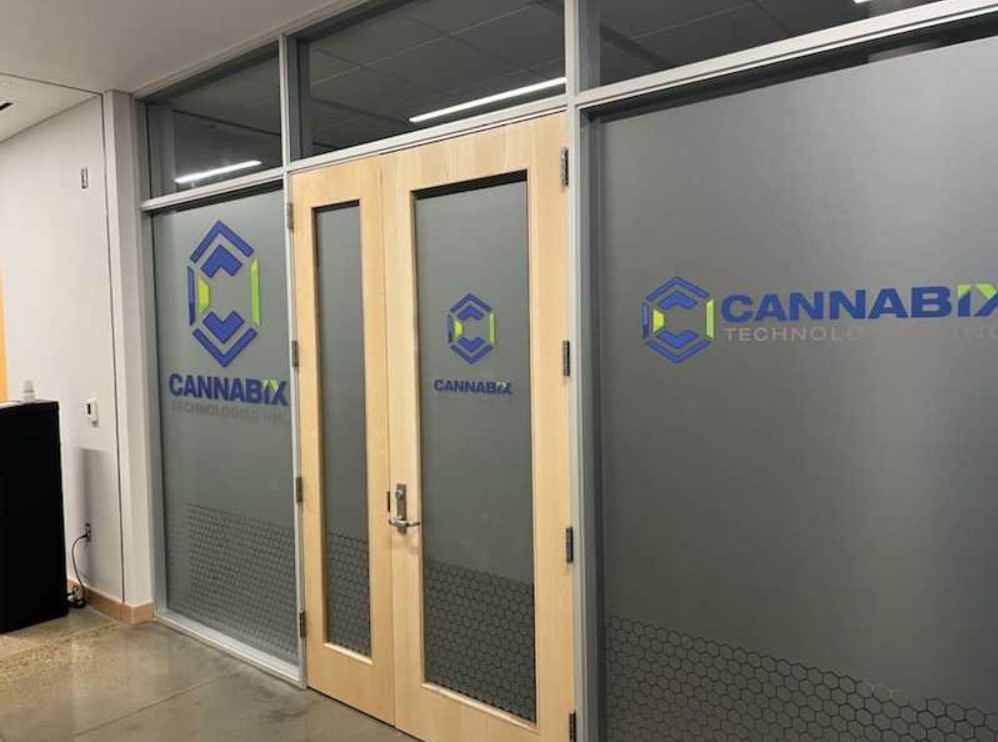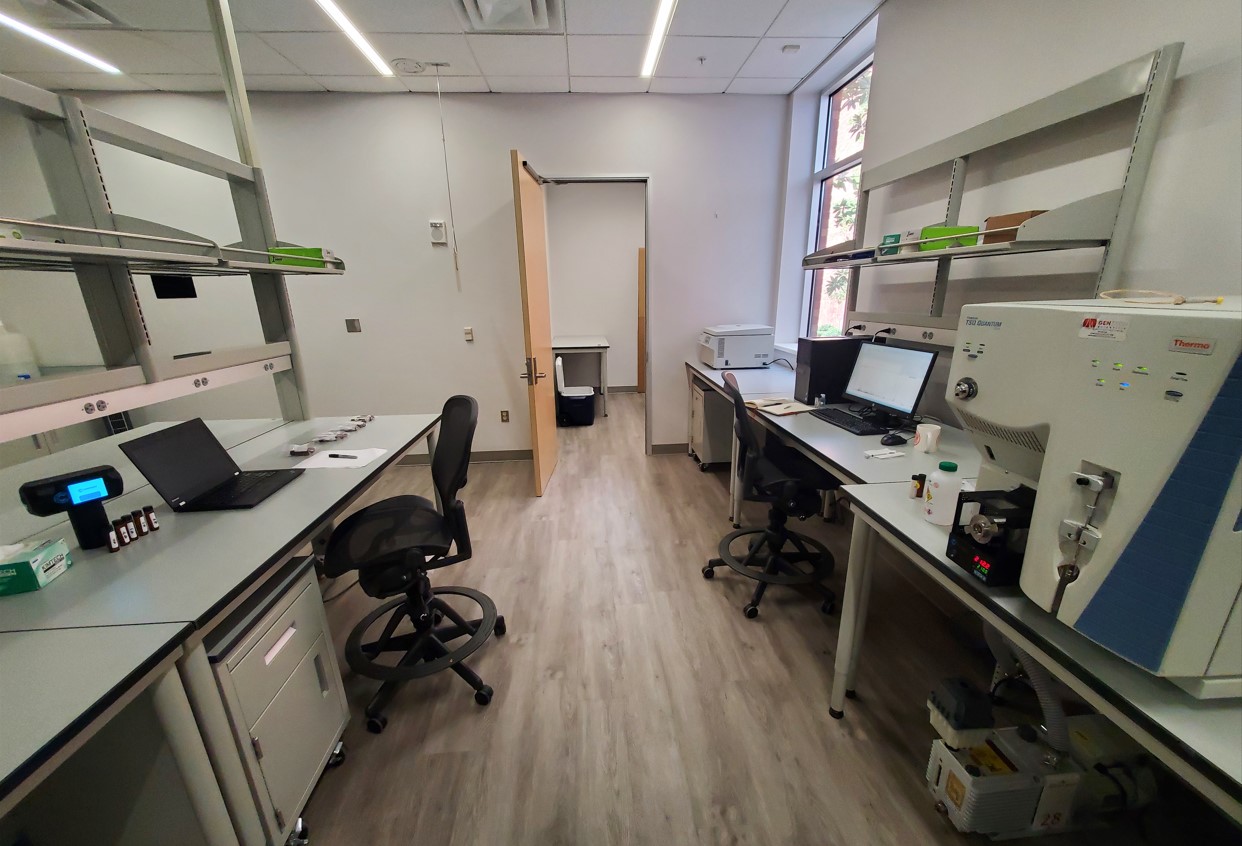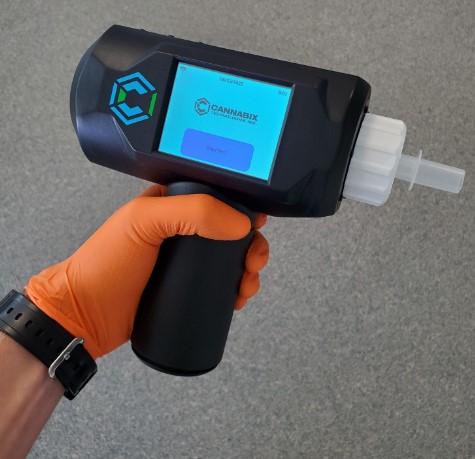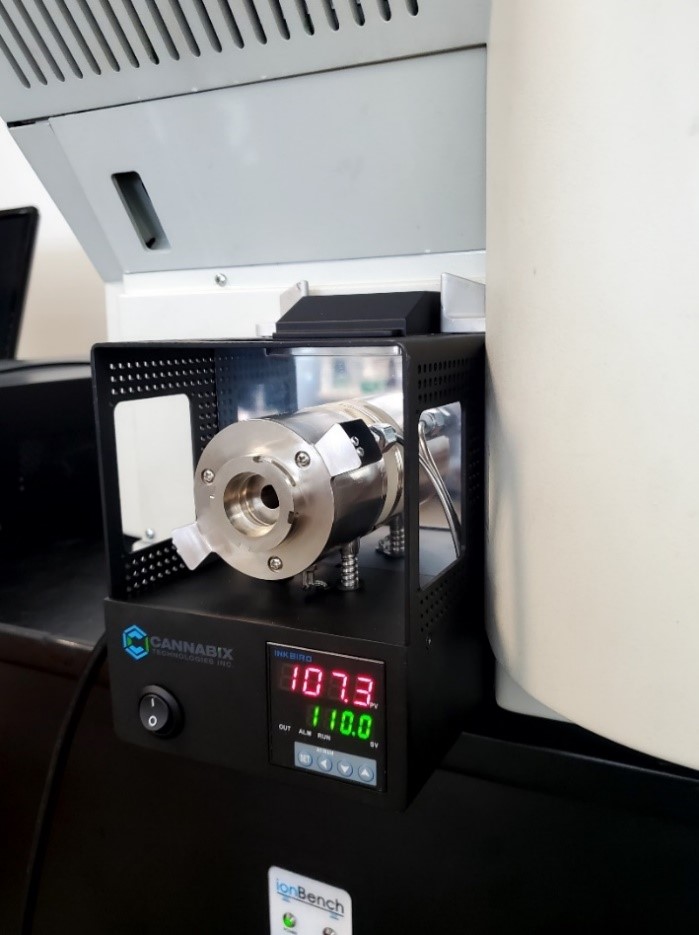VANCOUVER, British Columbia, Jan. 18, 2024 (GLOBE NEWSWIRE) -- Cannabix Technologies Inc. (CSE: BLO) (OTC PINK: BLOZF) (the “Company or Cannabix”) developer of marijuana and alcohol breath testing devices reports that analysis results from the collection of breath samples from a recent “green lab” testing day in Montgomery County, Maryland were successfully analyzed (with delta9-THC detected and quantified from breath samples after smoking and edibles consumption) at a third-party location for the first time. Breath samples taken on January 3, 2024 during the Maryland green lab held by the Montgomery County Police Department were shipped to the North Louisiana Criminalistics Laboratory (“NLCL”) (Fig. 1 and Fig. 2), based in Shreveport, LA for analysis. This represents the first time, such quantification analysis, with human breath samples, collected and analyzed with Cannabix’s proprietary laboratory-based marijuana detection equipment, has been successfully conducted outside of Cannabix’s own labs – marking a critical step to show reproducibility of Cannabix hardware and analysis methods in multiple and independent locations.
The data collected from 11 volunteer subjects (10 smokers and 1 subject who consumed THC infused edibles) showed similar results to those achieved during past green lab studies. The baseline (prior to consumption) delta9-THC breath concentrations were in most cases very low indicating no recent use of cannabis products. Thirty (30) minutes after observed consumption, the delta9-THC concentrations in breath per cartridge increased significantly – with the highest recorded values being around 25 ng/cartridge. After 60 minutes the THC concentrations in breath decreased but remained above baseline values. Subjects were then asked to re-dose after approximately 80 minutes after first cannabis consumption and analysis showed elevated levels of delta9-THC in breath in later time points, after re-dosing, even when compared to the levels observed after initial consumption.
Samples were analysed roughly 48 hours after collection and no obvious adverse effects related to storing or shipping were observed during the analysis process. The calibration curve acquired prior to analysing samples at the NLCL lab was similar to those used at the Company’s Burnaby, BC lab location.
Rav Mlait, CEO of Cannabix stated, “This is significant milestone for our marijuana breathalyzer system as we have now been able duplicate our latest quantification processes - outside of our own laboratories – at NCLC. Administrators at NCLC were able to prepare their calibration curve and duplicate Cannabix’s quantification analysis methods and achieve quantified breath samples for delta-9 THC from smoking and edibles. This marks a major step showing the ability to reproduce of our breath sample testing methods in multiple locations.”
The Company’s handheld Breath Collection Unit (“BCU”) (Fig. 3) and newly developed laboratory “MS Breath Sampler” (Fig. 4) are being used together to provide a new method for drug detection that complements gold-standard mass spectrometry (MS) and significantly simplifies laboratory analysis methods, reduces sample turnaround times (thus minimizing operating costs), while maintaining sensitive, precise results. By comparison, existing and legacy breath and saliva testing procedures require several sample extraction and preparation steps prior to analysis, and analysis itself can take from 1-3 hours per sample. This is expensive and impractical. Also, existing and legacy breath and saliva testing procedures tend to have inefficient, time-consuming collection methods, and recoveries are still often poor. Cannabix instrumentation is designed to be easy-to-use and seamlessly interfaced with techniques that toxicologists are already familiar with, requiring minimal training by all users.
Cannabix continues to test and develop its BCU and MS Breath Sampler to quantify delta-9 THC in human breath samples. Cannabix scientists are using an internal standard to generate a calibration curve for THC quantification in breath samples. Currently, a limit of detection and limit of quantification have been achieved with human subjects in the picogram range. This allows detection of THC from smoking and edibles up to 4+ hours after consumption.

Fig. 1 Cannabix hosted at North Louisiana Crime Lab

Fig. 2 Cannabix MSBS at North Louisiana Crime Lab

Fig. 3 Cannabix updated Breath Collection Unit (BCU)

Fig. 4 Cannabix “MS Breath Sampler” technology coupled with Thermo TSQ Ultra
About Cannabix Technologies Inc.
Cannabix Technologies Inc. is a developer of marijuana and alcohol breathalyzer technologies for law enforcement, workplaces and laboratories. Cannabix is working to develop delta-9 THC and alcohol screening devices. Delta-9 THC is the psychoactive component of marijuana that causes impairment. Breath testing for delta-9 THC would allow employers and law enforcement to identify recent marijuana use that better aligns with impairment. Cannabix is the developer of contactless breath alcohol detection devices for employers and other settings.
We seek Safe Harbor.
On behalf of the Board of Directors
“Rav Mlait”
CEO
Cannabix Technologies Inc.
For further information, contact the Company at info@cannabixtechnologies.com
The CSE has not reviewed and does not accept responsibility for the adequacy or accuracy of this release.
Cautionary Statement Regarding Forward-Looking Statements
This press release contains forward-looking information that involves various risks and uncertainties regarding future events. Such forward-looking information can include without limitation statements based on current expectations involving a number of risks and uncertainties and are not guarantees of future performance of the Company, such as final development of a commercial or prototype product(s), successful trial or pilot of company technologies, no assurance that commercial sales of any kind actually materialize; no assurance the Company will have sufficient funds to complete product development. There are numerous risks and uncertainties that could cause actual results and the Company’s plans and objectives to differ materially from those expressed in the forward-looking information, including: (i) adverse market conditions; (ii) risks regarding protection of proprietary technology; (iii) the ability of the Company to complete financings; (iv) the ability of the Company to develop and market its future product; and (v) risks regarding government regulation, managing and maintaining growth, the effect of adverse publicity, litigation, competition and other factors which may be identified from time to time in the Company's public announcements and filings. There is no assurance that its development of breathalyzer technologies will provide any benefit to the Company, and no assurance that any proposed new products will be built, will be successful in beta testing or clinical trials. The is no assurance that the Company will enter into any partnerships to advance any of its corporate initiatives or technologies. There is no assurance that any “patent pending” or “provisional patents” technologies licensed by the Company or owned by the Company will receive patent status by regulatory authorities. The Company is not currently selling commercial breathalyzers. Actual results and future events could differ materially from those anticipated in such information. These and all subsequent written and oral forward-looking information are based on estimates and opinions of management on the dates they are made and are expressly qualified in their entirety by this notice. Except as required by law, the Company does not intend to update these forward-looking statements.
Photos accompanying this announcement are available at:
https://www.globenewswire.com/NewsRoom/AttachmentNg/0f334b58-6fb9-49d2-91db-65faa8366907
https://www.globenewswire.com/NewsRoom/AttachmentNg/96da6280-2610-4b02-a571-85ab685f678e
https://www.globenewswire.com/NewsRoom/AttachmentNg/efff9ab7-c692-456a-a52c-af7d9e7038bd
https://www.globenewswire.com/NewsRoom/AttachmentNg/c51f93f3-b026-4150-9ec7-dd8569c1b0b8


